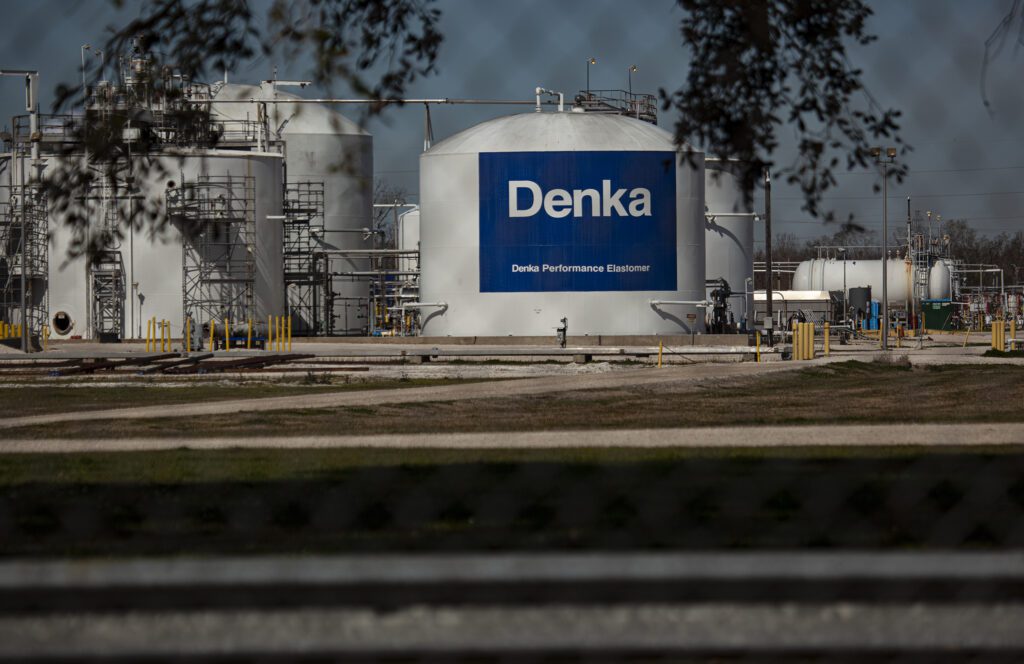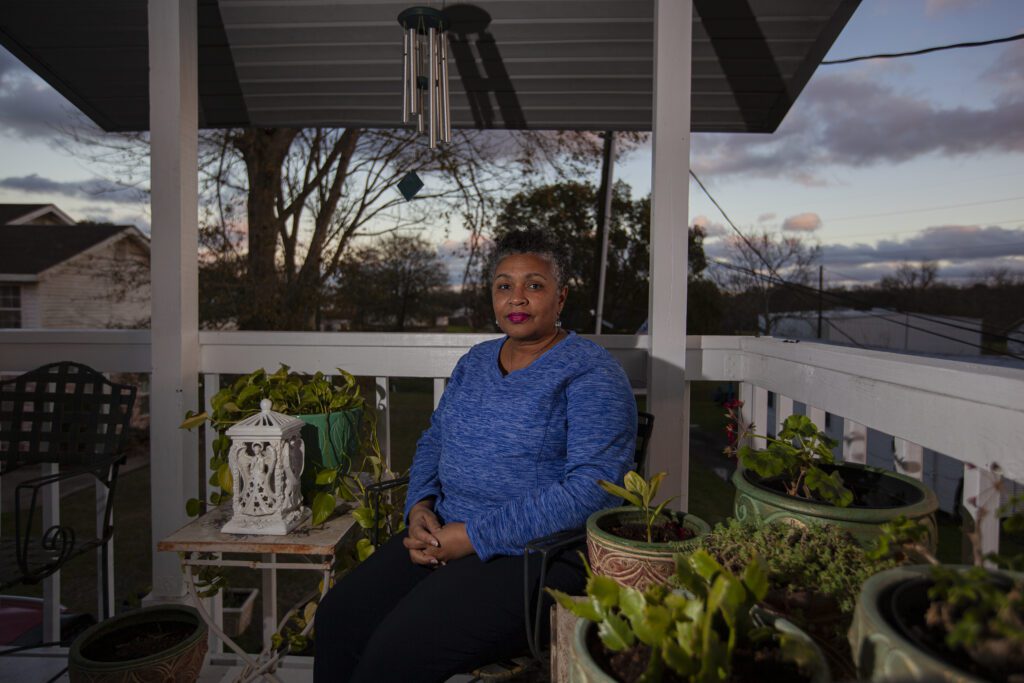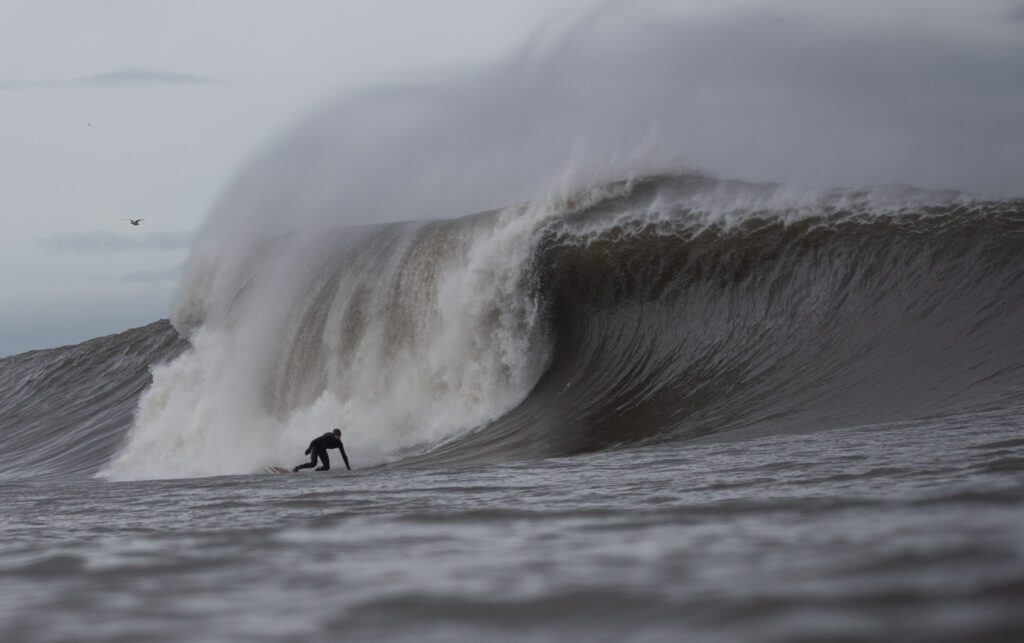The Surprising Link Between Neoprene And The USA’s ‘Cancer Alley’
A forthcoming documentary called ‘The Big Sea’ will change how you look at wetsuits.
Funny how certain smells take you right back.
Like after rain on a hot summer’s day, petrichor, as it’s known. Powerfully seductive not only in the present, but also in recall, like a perfume worn by a favoured school teacher. Miss Waite’s particular poison, if I’m not mistaken, which I’m not, was Poison by Dior. The close relationship between the olfactory and the amygdala — parts of the brain that control smell and emotion — is the reason odours can spark such high res nostalgia.
For surfers whose formative years took place in the 20th century’s era of bricks and mortar retail, it’s the surf shop’s heady, exotic musk that we most associate with the pastime that’d taken over our lives. It was part coconut Sex Wax, sure, expressly scented so to seduce you, but mainly the incidental wetsuit smell that hit as soon as you crossed the threshold. Not merely the scent of surfing, but its aura: an invisible, inescapable plume that heralded shiny, new surfing stuff. Most enticing of all was that subconsciously, it held the keys to the promised land — the waves you were about to catch in the near future.

You probably already know that your surfboard and wetsuit are made from oil. That’s because everything is made from oil. Salad, is made from oil. It takes around 10 calories of crude oil to produce a calorie of food in our current modern agricultural system. Life’s pretty oily alright.
That wetsuit smell comes from its main constituent, a synthetic rubber known as neoprene, first made by DuPont chemists in the 1930’s (and originally called DuPrene). Neoprene is a polymer made from chloroprene, itself something of a chemical nasty. Precisely how much of a nasty, well I’m not sure many civilian surfers have bothered to scrutinise too thoroughly. That is, until The Big Sea, the forthcoming documentary by Lewis Arnold and Chris Nelson exploring the relationship between the manufacture of chloroprene, and the dire health outcomes in communities near the Mississippi River between New Orleans and Baton Rouge. AKA Cancer Alley, USA.
Arnold, a photojournalist from NE England and lifelong surfer was shown an article about Cancer Alley by a colleague at The Guardian and decided to investigate further. “When I first went out and met people living there in St John’s, I was shocked. And then the more I looked into it, and considered the link between what was happening out there and surfing, well I was horrified.”
Chloroprene is manufactured at the Denka Performance Elastomer plant in St John’s Parish, which stands out even among Cancer Alley for its alarming health statistics. The EPA identified chloroprene as a likely human carcinogen in 2010, officially warning the community of the dangers of the Denka plant in 2016, when St. John’s had the highest cancer risk in the USA — 50 times the national average.

Having seen Arnold’s short film, Nelson joined the project as a writer and producer, and the pair reworked the story into a version to be screened at London Surf Film Festival in 2022 — the first real opportunity for a wetsuit buying audience to be confronted with the story.
“We’re really keen to be challenged,” explains Nelson. “We’re certainly not telling people what to do or think. But for the past 30 years, Lewis and myself and countless others like us, we were buying neoprene without any idea that we were complicit in the link between these families in Louisiana getting cancer. Now that we do know, we’ve changed the way we purchase. But ultimately it’s up to the consumers and the brands to do with it what they will.”
The separation between the surf enthusiast and the blighted communities in Louisiana, generations subjected to what the EPA has labelled “environmental racism” is stark. “One of the issues we faced is that we’re two white guys from the UK,” says Nelson. “How are we going to tell the story of a predominantly minority, low income community? The way we approached that was to let them use their voices to tell their lived experience — the best thing we could do was simply provide them a platform. What they told us was that they’d spoken to up to 50 news teams, and nothing’s happened. But surfers could make a big difference, we could be the people who start the ball rolling. If surfers were to say ‘We’re not using neoprene any more’ then what do cyclists and others say, when they find out?”

The hope is that The Big Sea not only encourages surfing to get its own house in order, but to be a driver of a much bigger change.
“We want to use the visibility and appeal of surfing,” echoes Arnold. “Denka are prepared to use it, they talk about how they enrich people’s lives through wetsuits made of neoprene. It’s one of the things that really stuck in my throat and made me determined to make this film, seeing them trying to legitimise a really damaging practice.”
So what of your actual, current wetsuit? The one you’ll wear next time you surf? Did it come to your lineup via Denka’s Louisiana plant? Possibly not. There’s a decent chance its component materials came from Denka’s other facility, the Omi plant in Japan that manufactures limestone-based neoprene.
So all good, then?
“Limestone based neoprene is marketed as an eco-friendly alternative to petrochemical neoprene” says Nelson, “Which it clearly isn’t: Iimestone is a finite resource quarried out of the earth, then heated in furnaces until it melts to make chloroprene, itself widely classified as both toxic and carcinogenic. Doesn’t sound very eco, does it? The fact that limestone neoprene is subject to such greenwashing is one of the real headwinds to change in the industry. Some of the scientists we talked to in making the film have said if anything, limestone-based chloroprene is even worse than petrochemical. People are being duped. Either way, whenever you buy a wetsuit made of neoprene, limestone or petrochemical based, you’re putting money into Denka.”

If only there were a functional, viable alternative technology to chloroprene wetsuits to emerge in the past few years. Like, say, growing rubber on trees. Could natural rubber indeed be surfing’s sylvanian bullet? A handful of wetsuit manufacturers have embraced natural rubber, but they remain outliers in the current market, which seems to regard it with something between determined apathy and mild suspicion. While Nelson and Arnold advocate for natural rubber alternatives to chloroprene as something of a no-brainer for the surf consumer, it’s worth noting that The Big Sea has been entirely financed independently.
Precisely how much of a land footprint would be required to switch the component materials for every wetsuit hanging in every surf shop — or fulfilment depot — globally from chloroprene to natural rubber, is uncertain. Anyone with an ear to the biosphere might furthermore have certain apprehensions about any cash crop grown around the equator, be it palm oil, coffee, chocolate, or rubber. Studies have shown deforestation rates in Cambodia are directly proportional to global rubber prices, to supply the car tire industry.
“Globally, there are problems with natural rubber” says Arnold, “But the capacity is there for responsible, certified rubber producers to make our wetsuits.” The PEFC and FSC certifications stipulated by Yulex, who produce rubber for Patagonia wetsuits, maintain the very highest ethical and environmental standards in the business. So it’s been both surprising and disappointing to Arnold and Nelson, to see how relatively little an impact chloroprene-alternative wetsuits have made in the recent surf hardware boom.

“Part of the reason the uptake hasn’t been what it might, is where the marketing focus is on,” Nelson explains. “We seem to be obsessed with ever more flex. I mean when’s the last time anyone tried on a new wetsuit and genuinely thought it wasn’t stretchy enough? My personal viewpoint is that we should be focusing on making wetsuits that last.”
If we were all to agree that we’ve already reached an acceptable flexibility threshold, then perhaps surfing’s finest creative, innovative product minds could shift their relentless striving for year on year improvement towards the materials and supply chain?
Alas, “Same Stretch As Last Year, Less Cancer” probably isn’t the compelling Add To Basket copy anyone wants to see, vendor or customer alike.
“You’re always gonna get an element of whataboutery” says Nelson. We hear that stuff quite a lot, ‘What about air travel?’” There are huge, complex issues surrounding living within our planetary means, and nobody is purporting to being able to solve them all with The Big Sea. Putting out fires is sometimes used to describe a tactical shortfalling, but one surely strategically preferable to say, not putting out fires?

“When you go to St Johns, and you sit down with someone in their front room and they tell you that their parents and sister died of cancer, that their daughter’s got cancer, and then you walk out on their street, and they point at this house and that house, like every single home being touched by cancer, you can’t help but feel this is a thing that you can do something about, right now. Air travel, for example, is a massive issue. But chloroprene and its link to surfing, we can solve that. It’s actually quite a straightforward thing to fix, and it will make a massive difference for this community, and for the soul of surfing in general. Right now we’re linked to this horrendously dirty process, but why are we? When it’s quite an easy thing to change.”
The Big Sea is due for release early autumn 2023.














Comments
Comments are a Stab Premium feature. Gotta join to talk shop.
Already a member? Sign In
Want to join? Sign Up